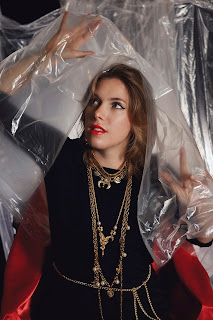Marina Laduda’s "Hot Mess": A Symphony of Chaos, Healing, and Selfhood
Amid the sunlit bustle of Naples’ historic cityscape, with tales spilling from windows flung wide to release the scent of espresso and history, gets the release it has waited so long to receive with the arrival of Hot Mess, the critically anticipated first full-length album from Marina Laduda herself. Released on November 11, 2025, Hot Mess is more than just another pop record—the culmination of sleepless nights and trans-Atlantic friendships and transformation on its creators’ part. Together with collaborator Matus Ferko from Slovakia and sound sculptor Igor Batovanja from the Czech Republic, Hot Mess simmers with fire and rain—It opens with the vengeful spark of “Take Two.” In other words? A musical glitter bomb to shake one’s patience to its foundations.
But beneath that sparkle lies Hot Mess, and Hot Mess has shadows too. One of the most biting instances comes with “Soledad,” which is more like the resonance of an empty room with a melancholy that softly swells. Here, Marina’s jazz background and musical theater experience come to the fore—her vocals weave between crying and sleeping. The Spanish title means more than mere poetic license; it’s an assertion of heritage. As someone caught between languages and hemispheres, Marina has always been the black sheep—too American in Europe and too European in America. “Soledad” is her confessional anthem and her ode to loneliness.
Then comes “Album of Scars,” which is nothing less than a neo-soul epic that is akin to taking an emotional photo album—every verse is a bruise, every chorus is a healed scar. Lukas Chejn’s lush guitar sounds and his son’s effervescent basslines imbue this song with lived-in wisdom. This is one song that makes you stop and take a deep breath. In “Album of Scars,” Marina doesn’t sing about pain; she interprets it. The live drumming by Daniel Soltis throbs in tandem with her to ensure that her musings are lodged firmly in the realm of the human.
But as Hot Mess draws to a close, “Aeternum” breathes softly through the embers like an invocation. Created during the peak of Marina’s grief over her father, her grandmother, and her dog, it combines the storytelling tradition of Bruce Dickinson with the sensitivity that only Marina can bring—an unswerving reflection on the inclusion that exists outside of death. As messy as Hot Mess may be, within the turmoil, the truth that Marina Laduda has discovered—and that she encourages us to discover within ourselves—is waiting to be found.
Instagram



Comments
Post a Comment